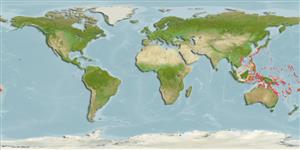Common names from other countries
>
Atheriniformes (Silversides) >
Atherinidae (Silversides) > Atherinomorinae
Etymology: Hypoatherina: Greek, hypo = under + Greek, atherina, the Greek name for the eperlane; 1770 (Ref. 45335).
More on author: Whitley.
Environment: milieu / climate zone / depth range / distribution range
Ökologie
seewasser; tiefenbereich 0 - ? m (Ref. 9760). Tropical
Western Pacific: New Guinea, northern and eastern Australia, Madang, Maron and Bougainville Islands. Possibly present over a wide range in Melanesian waters. Aso found around Lord Howe Island.
Size / Gewicht / Alter
Maturity: Lm ? range ? - ? cm
Max length : 12.5 cm TL Männchen/unbestimmt; (Ref. 9760)
Rückenflossenstacheln (insgesamt): 6 - 9; Rückenflossenweichstrahlen (insgesamt): 8-11; Afterflossenstacheln 1; Afterflossenweichstrahlen: 11 - 14. Lips absent. Ascending process of premaxilla, short and broad. Gill rakers in first lower gill arch 18-22. Midlateral scales 39-46. Predorsal scales 17-22.
Inhabits waters close inshore. Often seen to jump out of the water, especially after sunset when they appear as fluorescent streaks. At night they appear to aggregate with Atherinomorus capricornensis around One Tree Island (eastern Australia). Probably eaten by larger commercial species (Ref. 9760).
Life cycle and mating behavior
Geschlechtsreife | Fortpflanzung | Ablaichen | Eier | Fecundity | Larven
Oviparous, distinct pairing during breeding (Ref. 205).
Ivantsoff, W. and L.E.L.M. Crowley, 1999. Atherinidae. Silversides (or hardyheads). p. 2113-2139. In K.E. Carpenter and V.H. Niem (eds.) FAO species identification guide for fishery purposes. The living marine resources of the Western Central Pacific. Volume 4. Bony fishes part 2 (Mugilidae to Carangidae). FAO, Rome. (Ref. 9760)
IUCN Rote Liste Status (Ref. 130435)
CITES (Ref. 128078)
Not Evaluated
Bedrohung für Menschen
Harmless
Nutzung durch Menschen
Mehr Information
ReferenzenAquakulturAquakultur ProfilZuchtlinienGenetikElectrophoresesVererbbarkeitKrankheitenVerarbeitungMass conversion
PartnerBilderStamps, Coins Misc.LauteCiguateraGeschwindigkeitSchwimmstilKiemenoberflächeOtolithsGehirngrößeSehfähigkeit
Tools
Zusatzinformationen
Download XML
Internet Quellen
Estimates based on models
Preferred temperature (Ref.
115969): 24 - 29.3, mean 28.4 (based on 1430 cells).
Phylogenetic diversity index (Ref.
82804): PD
50 = 0.5001 [Uniqueness, from 0.5 = low to 2.0 = high].
Bayesian length-weight: a=0.00562 (0.00244 - 0.01296), b=3.11 (2.91 - 3.31), in cm Total Length, based on LWR estimates for this (Sub)family-body shape (Ref.
93245).
Trophic level (Ref.
69278): 3.3 ±0.4 se; based on size and trophs of closest relatives
Widerstandsfähigkeit (Ref.
120179): hoch, Verdopplung der Population dauert weniger als 15 Monate. (Preliminary K or Fecundity.).
Fishing Vulnerability (Ref.
59153): Low vulnerability (10 of 100).
